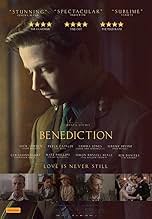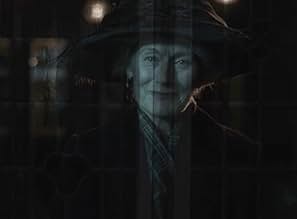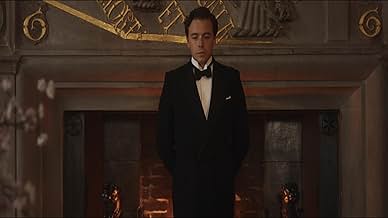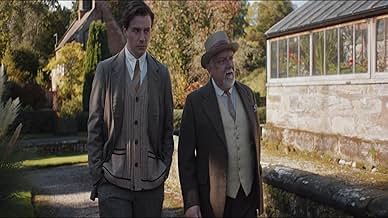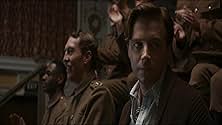AVALIAÇÃO DA IMDb
6,6/10
4,2 mil
SUA AVALIAÇÃO
A história do poeta, escritor e soldado inglês Siegfried Sassoon.A história do poeta, escritor e soldado inglês Siegfried Sassoon.A história do poeta, escritor e soldado inglês Siegfried Sassoon.
- Prêmios
- 9 vitórias e 19 indicações no total
Avaliações em destaque
Ignore the naysayers. This is a beautiful, deeply sad, elegant, and poetic film from one of the greatest filmmakers working today, Terence Davies. Many here are dismissing this film as "catty", "stereotypical", etc. It's not in the least. It's a film based on the life of Siegfried Sassoon, a real UK poet who served in WW1 with Wilfred Owen, the brilliant soldier who wrote the poetry that was the basis for Benjamin Britten's magnificent War Requiem and who was a friend/lover of Sassoon. Sasson was a poet himself, an artist, and like all artists, felt alienated throughout his life from the world he lived in. We see that art world from behind the curtain, and anyone who has ever worked, or been privvy to, the behind the scenes of the artistic world will attest this is how it is. This is the huge source of Sassoon's "alienation", not just that he's a homosexual, which many reviewers are insisting. There's a wonderful line that sums him up perfectly, and that is "most people live in the moment. You want to live in eternity". That's a beautiful, poetic summation not only of Sassoon's life, but of art in general. Davies's films often draw on art for their inspiration, and this one is no exception.
All of the performances are 1st rate, the cinematography is exquisite, the production design is breath taking, and the dialogue is some of the best I've heard in a film in a very, very long time. Thanks to Mr. Terence Davies for making such an extraordinary movie.
All of the performances are 1st rate, the cinematography is exquisite, the production design is breath taking, and the dialogue is some of the best I've heard in a film in a very, very long time. Thanks to Mr. Terence Davies for making such an extraordinary movie.
It's an anti-war biopic of the English poet Siegfried Sassoon that covers Sassoon's life from 1914 to the 1960s.
Siegfried Sassoon (Jack Lowden/Peter Capaldi) was a Second Lieutenant during World War I. His younger brother, Hamo (Thom Ashley), is killed during the war. Siegfried is further horrified by the tremendous human toll in death and lifelong disability caused by military leadership in which he no longer believes. Already a well-known poet, he refuses further participation in the war and is sent to the Craiglockhart War Hospital near Edinburgh technically for shell shock. There Siegfried meets and befriends Wilfred Owen (Matthew Tennyson), a much younger man. Siegfried also explicitly recognizes his own homosexuality.
The film then follows his anti-war sensibilities through snippets of his poetry and his chaotic love life, mainly focused on Ivor Novello (Jeremy Irvine) and Stephen Tennant (Calam Lynch/Anton Lesser). At a certain point, he tries to escape the chaos by marrying Hester Gatty (Kate Phillips/Gemma Jones). Together they have a son. George (Richard Goulding), but clearly, the marriage does not heal Sassoon's memories.
The film uses footage from the trenches in World War I and occasionally flips in time between the young Sassoon and the elderly Sassoon. Some of the editing decisions made little sense to me, particularly the early scene forecasting his conversion to Catholicism. Some edits made the film more complex than necessary. Nevertheless, the movie successfully portrays Sassoon as disabled because of World War I, from which he never psychologically recovered. This is clear from the multiple references to Wilfred Owens' poem, "Disabled."
Siegfried Sassoon (Jack Lowden/Peter Capaldi) was a Second Lieutenant during World War I. His younger brother, Hamo (Thom Ashley), is killed during the war. Siegfried is further horrified by the tremendous human toll in death and lifelong disability caused by military leadership in which he no longer believes. Already a well-known poet, he refuses further participation in the war and is sent to the Craiglockhart War Hospital near Edinburgh technically for shell shock. There Siegfried meets and befriends Wilfred Owen (Matthew Tennyson), a much younger man. Siegfried also explicitly recognizes his own homosexuality.
The film then follows his anti-war sensibilities through snippets of his poetry and his chaotic love life, mainly focused on Ivor Novello (Jeremy Irvine) and Stephen Tennant (Calam Lynch/Anton Lesser). At a certain point, he tries to escape the chaos by marrying Hester Gatty (Kate Phillips/Gemma Jones). Together they have a son. George (Richard Goulding), but clearly, the marriage does not heal Sassoon's memories.
The film uses footage from the trenches in World War I and occasionally flips in time between the young Sassoon and the elderly Sassoon. Some of the editing decisions made little sense to me, particularly the early scene forecasting his conversion to Catholicism. Some edits made the film more complex than necessary. Nevertheless, the movie successfully portrays Sassoon as disabled because of World War I, from which he never psychologically recovered. This is clear from the multiple references to Wilfred Owens' poem, "Disabled."
Brownie points to Netflix for sponsoring this movie, which must have only limited appeal even to older gay viewers. Jack Lowden stars as World War One poet Siegfried Sassoon (Jack Lowden), whose emotional and sexual life director Terence Davies explores in this gloomy biopic. After publishing a letter condemning the military chiefs for the appalling death toll the conflict has brought, Sassoon is lucky not to be shot as a traitor; they send him to a mental institution where he meets and falls in love with fellow poet Wilfred Owen who's suffering from shell-shock (as PTSD was called in those dark days). Owen is sent back to die in Picardy in the last week of the war. The screenplay skates past Sassoon's brief return to active service.
After the war Siegfried has a brief affair with Ivor Novello (Jeremy Irvine), shown here as the uber-bitch in London's far-from-discreet gay set. Siegfried has a longer but equally unhappy affair with upper-crust socialite Stephen Tennant (Calam Lynch), the model for Sebastian Flyte in Evelyn Waugh's BRIDESHEAD REVISITED. Unhappy with homosexual life and converting to Catholicism, Sassoon marries. Flash-forward to his later life shows Sassoon (now played by Peter Capaldi) at odds with his wife and their son.
Throughout the movie Davies inserts horrific glimpses of battle casualties which never cease to haunt Sassoon. His poems are voice-overed from time to time, although two poems of Owen's make it clear that Sassoon was somewhat Second Division in comparison.
This is a beautifully shot movie, and all the cast perfectly evoke the look and feel of the 1920s and 30s, but the scriptwriter's prevailing tone is depressing. Male lovers and a wife all fail to bring happiness to Siegfried Sassoon. A life unfulfilled; a glum movie.
After the war Siegfried has a brief affair with Ivor Novello (Jeremy Irvine), shown here as the uber-bitch in London's far-from-discreet gay set. Siegfried has a longer but equally unhappy affair with upper-crust socialite Stephen Tennant (Calam Lynch), the model for Sebastian Flyte in Evelyn Waugh's BRIDESHEAD REVISITED. Unhappy with homosexual life and converting to Catholicism, Sassoon marries. Flash-forward to his later life shows Sassoon (now played by Peter Capaldi) at odds with his wife and their son.
Throughout the movie Davies inserts horrific glimpses of battle casualties which never cease to haunt Sassoon. His poems are voice-overed from time to time, although two poems of Owen's make it clear that Sassoon was somewhat Second Division in comparison.
This is a beautifully shot movie, and all the cast perfectly evoke the look and feel of the 1920s and 30s, but the scriptwriter's prevailing tone is depressing. Male lovers and a wife all fail to bring happiness to Siegfried Sassoon. A life unfulfilled; a glum movie.
My initial reaction was, "unfocused and messy," but someone else called it a collage, and I think that is a more accurate description of the film.
It's not a biography, it's not really about war, or love, or living a closeted life during a specific period in UK history; it's not about aging; it's not about poetry, or trauma. The title suggests it might be about guidance, blessing, or redemption, but in regard to what, I can't really say.
It's also about all of those things, depending on the minute. The movie changes focus quite a few times, and I found that incredibly frustrating. After two and a half hours, I did not leave with any firmed-up impression of Sassoon, or the basic intention of the film.
Having said that, the lead actor and the rest are all perfectly enjoyable to watch, the dialogue is organic, and aside from spliced-in war footage, it is pleasing to the eye. It's a good choice for watching on demand or otherwise at home. But it's not a movie that lingers.
It's not a biography, it's not really about war, or love, or living a closeted life during a specific period in UK history; it's not about aging; it's not about poetry, or trauma. The title suggests it might be about guidance, blessing, or redemption, but in regard to what, I can't really say.
It's also about all of those things, depending on the minute. The movie changes focus quite a few times, and I found that incredibly frustrating. After two and a half hours, I did not leave with any firmed-up impression of Sassoon, or the basic intention of the film.
Having said that, the lead actor and the rest are all perfectly enjoyable to watch, the dialogue is organic, and aside from spliced-in war footage, it is pleasing to the eye. It's a good choice for watching on demand or otherwise at home. But it's not a movie that lingers.
"Many live for the moment, you live for the eternity" British poet Siegfried Sassoon's son to his father in his final days--as the poet continues to bemoan the dead soldiers of of WWI who died for a cause that had changed from what it was when they enlisted. Thanks to Terrence Davies' film I have come to appreciate Sassoon's poetry. As a film, I prefer the comparable film "Under Milkwood" on the life and poetry of Dylan Thomas. A trivial highlight of the film: T E Lawrence (a.k.a. Lawrence of Arabia) attending the very private wedding of Sassoon! Though mentioned briefly as an admirer of the poet Sassoon, Noel Coward never gets shown in the film. Some aspects of the screenplay are very impressive, while some are not (switching back and forth in time, needlessly, those relating to one of Sassoon's many gay paramours).
Você sabia?
- CuriosidadesSeven of Siegfried Sassoon's poems were narrated in the film: Concert Interpretation, Died of Wounds, When I'm among a Blaze of Lights, To my Mother, To my Brother, Attack, and Invocation.
- Erros de gravaçãoSassoon did not discard his M.C. medal as shown in this film. He tossed away the medal's corresponding ribbon. The medal itself was inherited by Sassoon's son George.
- Citações
Dr. Rivers: Why not?
Siegfried Sassoon: Too afraid, too inhibited. Shamed by an inner corruption. Or perhaps it's simply because of... What's the phrase? "The love that dare not speak its name."
Dr. Rivers: You are not alone in that respect.
Principais escolhas
Faça login para avaliar e ver a lista de recomendações personalizadas
- How long is Benediction?Fornecido pela Alexa
Detalhes
- Data de lançamento
- Países de origem
- Centrais de atendimento oficiais
- Idiomas
- Também conhecido como
- 베네딕션
- Locações de filme
- Chillington Hall, Port Lane, Brewood, Wolverhampton WV8 1RE, Reino Unido(Interiors and outdoor scenes)
- Empresas de produção
- Consulte mais créditos da empresa na IMDbPro
Bilheteria
- Faturamento bruto nos EUA e Canadá
- US$ 201.093
- Fim de semana de estreia nos EUA e Canadá
- US$ 50.970
- 5 de jun. de 2022
- Faturamento bruto mundial
- US$ 847.418
Contribua para esta página
Sugerir uma alteração ou adicionar conteúdo ausente




